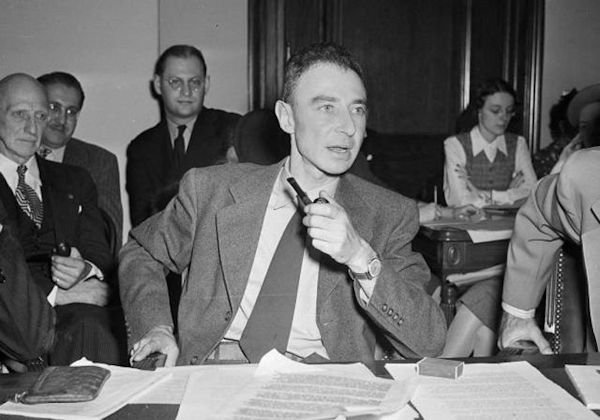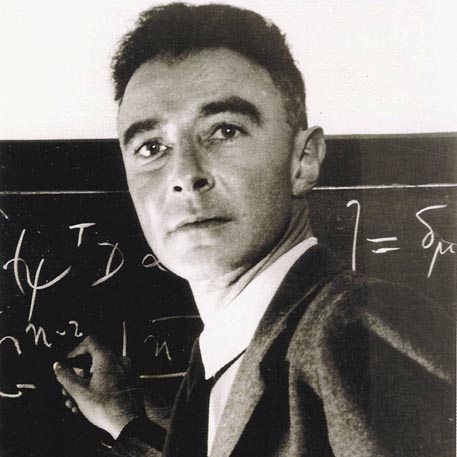Robert Oppenheimer Security Hearing
The 1954 Security Hearing of Robert Oppenheimer: An Account
by Douglas O. Linder (2020)

J. Robert Oppenheimer, testifying
Robert Oppenheimer, “the father of the atomic bomb,” never faced an actual criminal trial, it just seemed and felt like one. Convicted of no crime, Oppenheimer lost neither his life nor his liberty, merely his security clearance. Nonetheless, for the director of the Manhattan Project to lose his access to sensitive documents and other materials relating to the nation’s nuclear program is a testament to the powerful grip communist witch-hunting had on the United States in the early 1950s. It is fair to say that Oppenheimer was the prominent victim of the McCarthy era. Moreover, the 993-page hearing transcript prepared by the Atomic Energy Commission (AEC), In the Matter of Robert Oppenheimer, was as Oppenheimer’s Pulitzer-Prize winning biographers called in their book American Prometheus, “a seminal document of the early Cold War.” Oppenheimer, the philosopher-scientist, is a compelling figure, and the story of his defeat, which was also a defeat for American liberalism, is a compelling story.
Background
Robert Oppenheimer was born in New York City in 1904, the son of wealthy, non-observant Jewish parents. The Oppenheimer family had an impressive art collection, including works by Picasso, Vuillard, and three Van Gogh originals. Robert has a younger brother named Frank, who would also become a nationally prominent physicist.
Robert was a superb student, with interests as varied as French literature and mineralogy and chemistry. After entering Harvard College, Robert suffered a colitis attack which led to the family’s decision to hire an English teacher to work with him during his recovery. The teacher, Herbert Smith, took Robert to New Mexico, beginning Oppenheimer’s long-term love affair with horseback riding and the American Southwest. Returning to Harvard, Oppenheimer developed a strong interest in experimental physics. He graduated summa cum laude in just three years.
After graduation, Robert studied physics in Europe, working with some of the giants in the field, including Max Born at the University of Gottingen. During this period, Oppenheimer became a chain smoker. Often he was so focused on his work that he neglected to eat for long periods of time. But his reputation as a brilliant theoretical physicist quickly developed, and Robert became friends with such scientists as Werner Heisenberg, Enrico Fermi, and Edward Teller. Some fellow students, however, resented his enthusiasm and intensity, accusing him of essentially taking over seminars with his constant parade of observations and questions.
When Robert returned to the United States in 1927 after receiving his doctorate, he was awarded a fellowship at Caltech, where he worked closely with Linus Pauling (until, that is, Pauling decided Robert had taken too much of an interest in his wife) in attacking the nature of the chemical bond. The next year, Oppenheimer returned to Europe, giving lectures on quantum physics and other subjects, in Dutch, at the University of Leiden. The following year, Oppenheimer accepted a faculty appointment at Berkeley, where he would continue teaching and researching for fourteen years. His students found him mesmerizing. They called him “Oppie.”

Oppenheimer’s academic interests were broad and his contributions to the field of physics great. He worked with Ernest Lawrence on the development of the cyclotron. He produced major advances in quantum field theory, nuclear physics, spectroscopy, and general relativity studies. In 1930, he published a paper that predicted the existence of the positron, and in 1938 a paper that predicted the existence of black holes. Oppenheimer’s work is credited with leading to a resurgence of scientific work in the field of astrophysics. Among other top scientists, Oppenheimer was known for his elegant solutions, his ability to inspire others to great work, and for his impatience—he never wrote long papers and sometimes his mathematics was a bit sloppy. He was also considered somewhat eccentric, and had a passion for subjects ranging from poetry to Hinduism that many other scientists could not relate to.
Beginning in the mid-1930s, Robert became increasingly interested in civil liberties and liberal causes. In 1934, he gave 3% of his annual salary to support physicists fleeing Nazi Germany. He attended rallies in support of union causes and donated to a variety of progressive causes that would become suspect in the McCarthy era. He was especially active in support of the Republican (anti-fascist) cause in the Spanish civil war. He also, during the period of 1937 to 1942, was a member of a “discussion group” that included Communist Party members. As a result of contacts such as these, the FBI opened a file on Oppenheimer in March 1941...."Continued
